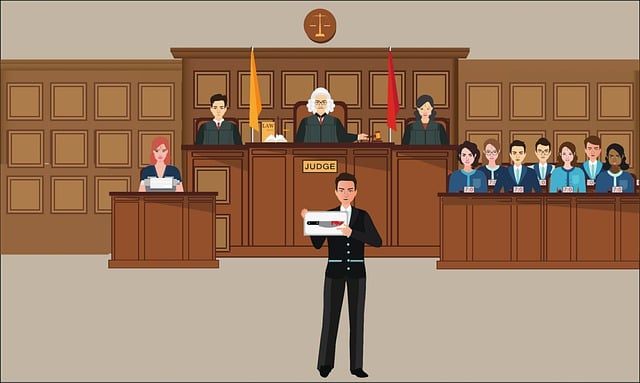The Burden of Proof is a critical concept in Criminal Law, requiring prosecutors to prove defendant guilt beyond reasonable doubt to secure a conviction. This stringent standard protects individuals from wrongful accusations, influencing case investigations and verdicts. Defense attorneys play a vital role by scrutinizing evidence and presenting alternative arguments to foster reasonable doubt, shaping the integrity of the justice system. Understanding how the Burden of Proof affects verdicts is essential for ensuring fair outcomes throughout the criminal justice process.
In the intricate realm of criminal law, understanding the burden of proof is paramount. This fundamental concept dictates the standard by which evidence is measured, profoundly impacting the outcomes of trials. This article explores how the burden of proof influences verdicts, delving into its impact on accused persons and examining shifting standards in diverse cases. From theoretical principles to real-world scenarios, we uncover the intricate relationship between evidentiary requirements and justice served.
- Understanding the Burden of Proof: A Fundamental Concept in Criminal Law
- The Impact of a High Burden of Proof on Accused Persons
- When Does the Standard of Proof Shift: Cases and Counterexamples
- Real-World Scenarios: How Burden of Proof Influences Verdicts in Criminal Trials
Understanding the Burden of Proof: A Fundamental Concept in Criminal Law

In Criminal Law, understanding the Burden of Proof is paramount as it directly influences verdicts. This fundamental concept refers to the legal obligation on a party—typically the prosecution—to convince a jury or judge of a defendant’s guilt beyond a reasonable doubt. The burden doesn’t simply require proving that something is true; instead, it demands eliminating any reasonable alternatives or doubts. This intricate balance ensures fairness, preventing wrongful convictions.
The impact of the Burden of Proof is profound, affecting how cases are investigated and prosecuted across the country. In general criminal defense, attorneys leverage this principle to protect their clients’ rights. By challenging evidence, presenting alternative theories, and raising reasonable doubts, they aim to undermine the prosecution’s case, demonstrating that a reasonable jury could acquit, not convict. This process is crucial in maintaining the integrity of the respective business of the justice system.
The Impact of a High Burden of Proof on Accused Persons

In criminal law cases, the concept of a high burden of proof significantly influences the experiences and outcomes for accused persons. The standard of beyond a reasonable doubt sets a rigorous threshold for prosecutors to meet, ensuring that convictions are based on substantial evidence and not mere speculation. This heightened burden of proof acts as a safeguard, protecting individuals from wrongful accusations and potential miscarriages of justice. When applied rigorously, it can lead to the complete dismissal of all charges if the jury trials cannot establish guilt without a reasonable doubt.
Accused persons face a challenging task when navigating this demanding legal standard, as they must confront an extensive body of evidence aimed at proving their innocence. While achieving extraordinary results under such circumstances is not impossible, it demands meticulous preparation, thorough cross-examination, and strategic argumentation from defense attorneys. The impact extends beyond the verdict, shaping the overall perception of fairness within the criminal justice system.
When Does the Standard of Proof Shift: Cases and Counterexamples

The standard of proof is a fundamental aspect of any criminal law case, significantly influencing verdicts and outcomes. In most jurisdictions, the general rule is that the prosecution bears the burden of proving guilt beyond a reasonable doubt. This standard requires the fact-finder to be convinced to a level of near certainty—often described as 95% or higher—that the defendant committed the crime. Achieving extraordinary results in such cases demands robust investigation, meticulous preparation, and persuasive legal arguments from defense attorneys representing general criminal defense across the country.
However, there are instances where the burden of proof shifts to the defendant. This occurs in specific circumstances, such as when a defendant raises an affirmative defense, like self-defense or lack of mental capacity. In these cases, the defendant must provide sufficient evidence to support their claim, and the fact-finder will then determine whether the evidence is persuasive enough to raise a reasonable doubt about guilt. Counterexamples might include situations where the defendant’s actions are so inherently incriminating that no amount of evidence can rebut the presumption of guilt, ensuring a fair but swift resolution.
Real-World Scenarios: How Burden of Proof Influences Verdicts in Criminal Trials

In criminal trials, the burden of proof is a pivotal factor that significantly influences verdicts. It refers to the legal obligation placed on prosecutors to present compelling evidence and convince the jury or judge beyond a reasonable doubt. This principle ensures fairness, as it requires the state to prove its case robustly, avoiding potential wrongful convictions. In real-world scenarios, understanding how the burden of proof affects verdicts is essential throughout all stages of the investigative and enforcement process.
When prosecutors meet this high standard, it becomes easier for juries to reach just decisions. Conversely, insufficient evidence or a failure to satisfy the burden can lead to acquittals, highlighting the significance of thorough investigations and robust legal arguments. Achieving extraordinary results in criminal law cases often hinges on mastering this aspect, ensuring that justice is served without compromising the rights of the accused.
The burden of proof is a cornerstone of criminal law, profoundly influencing verdicts by ensuring fairness and safeguarding against wrongful convictions. Understanding this concept and its impact on both accused persons and trial outcomes is essential in navigating the intricate landscape of criminal justice. By examining real-world scenarios, we’ve seen how a high burden of proof acts as a shield for the accused, while shifts in standards can lead to significant legal consequences. Ultimately, recognizing How Burden of Proof Affects Verdicts is crucial for maintaining a just and effective criminal justice system.






